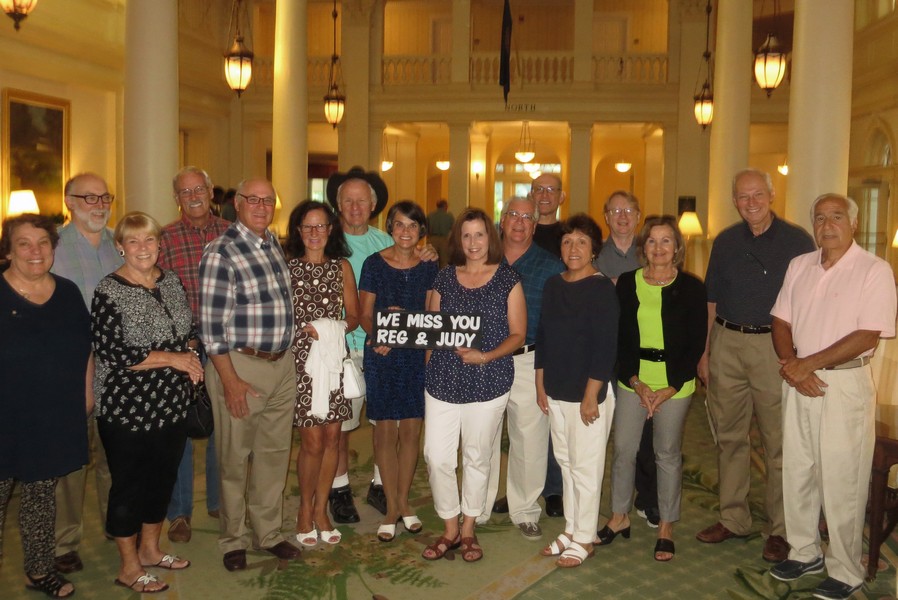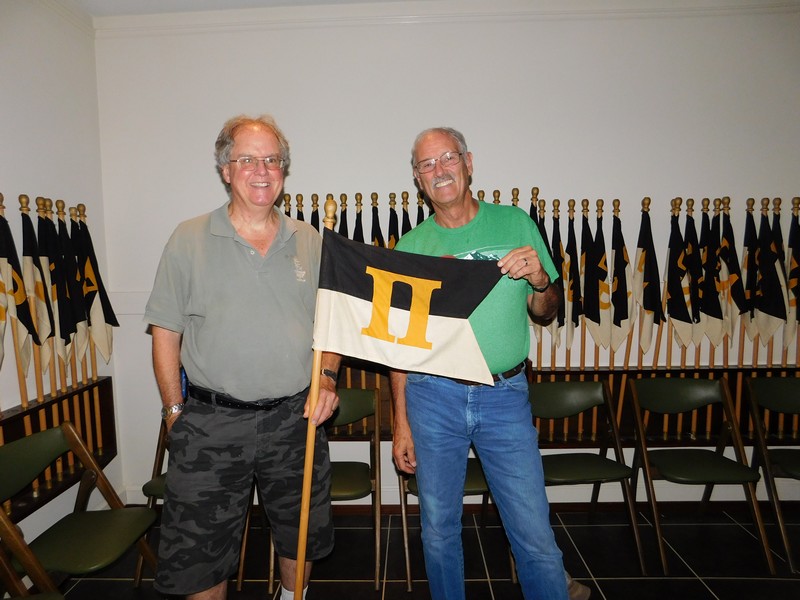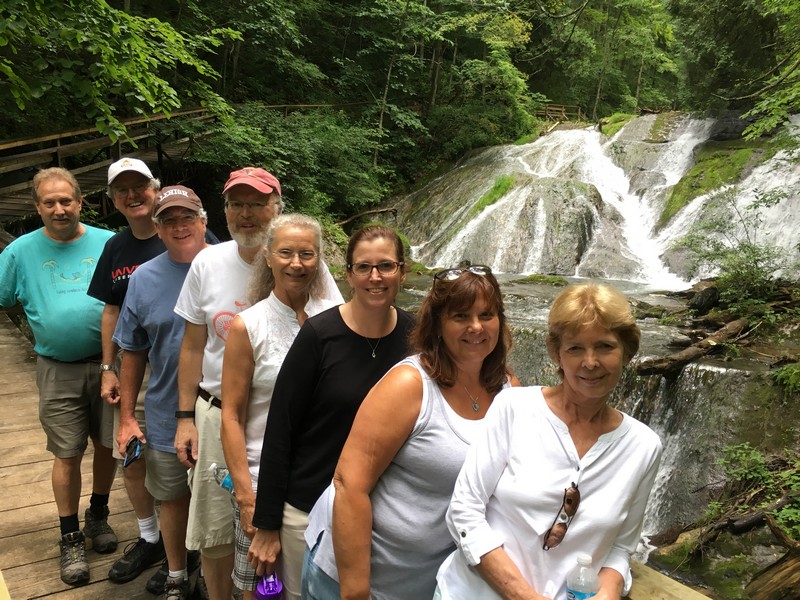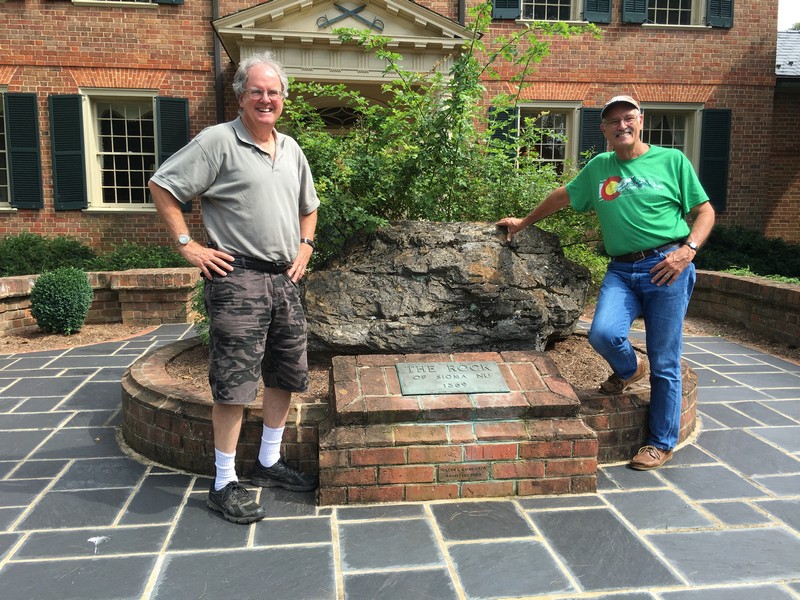Pi (Lehigh) Alumni Reunions Set the Standard
Chapter & Alumni News
This past July, thirteen brothers from Pi (Lehigh) Chapter convened for a long weekend at the Homestead Resort in Hot Springs, Virginia to reconnect, visit the Headquarters Shrine, and embody the Fraternity’s mission to perpetuate lifelong friendships. The group of 24 brothers and spouses were all from the graduating classes of ’71 – ’73. Their reunion included a pilgrimage to the Rock in Lexington, Va. and a banquet dinner. We took some time to sit down with Owen J. Jones III (Lehigh) to get some advice on what other alumni groups can learn from Pi Chapter’s continued alumni engagement, despite not having an active collegiate chapter.

Pi (Lehigh) Chapter alumni have always been well known for their connectivity throughout the years, especially their in-person get-togethers. What have been some activities you all have done in the past?
Past events have included annual reunions at Lehigh for a football weekend, white water rafting trip down the Colorado River, white water rafting trip in Idaho, hiking trip through Maui and Kauai, sailing on a private charter up the Pacific Northwest coast, and a schooner charter through the Virgin Islands.
The football reunions usually have the most attendance but encouraging smaller groups of alumni, of similar age and class years, to find their own annual traditions is very important.
Why is it important for alumni without current active chapters to consider these types of personal get-together events?
While we communicate with each other over the past 50 years in the manner most people do – Christmas cards, letters, phone calls, e-mail, texts – these vacations we take together allow us to spend a lot of one-on-one time with guys we haven’t seen in quite some time. We get a chance to catch up on everyone’s lives, family, career, health, travel and experiences. Just as important, it gives us time together to reminisce and go back to a time when we were all living together in the Chapter House. The old nicknames reappear. Current life status, accomplishments, successes, executive positions and titles seem to disappear or take a back seat to the memories from another time. Stories, events, and relationships get rehashed again – probably often embellished – with the latest version espoused seeming to get the best laughs and general acceptance.

What role does this continued engagement play in future recolonization plans?
By keeping us communicating with each other we get to discuss the status of possible future recolonization, reflect on the reasons for the chapter’s closure, and get the feelings of everyone about the issues and requirements going forward with recolonization. Many of us, including myself, remember things the way they were and wonder if a group, with the combined collegiate experiences such as ours, exist and survive today. However, we realize that each generation has different events surrounding them and different reasons to bond with each other. They will generate a “new” Pi Chapter with their own unique memories. Our mutual ties to the Fraternity and our individual philosophy of why we all became Sigma Nus will be the glue that allows all generations of Pi Chapter to find commonality and bond together as brothers.
How does this continued engagement help support morale surrounding a possible future recolonization?
While these reunions serve as a conduit for communication, morale about recolonization seems to take the form of all of us wishing Sigma Nu still was still active at Lehigh and didn’t need to go through a recolonization effort. We’d love to have Pi Chapter back on Lehigh’s campus.

How can other alumni in a similar situation get started with planning and connecting everyone?
A good start is to get a list of brothers and their contact information. That can be obtained from the Headquarters and Sigma Nu Educational Foundation staff as well as from one’s respective college or university. These lists, in addition to the current prevalence and opportunities of social networking that is going on, served as my basis for starting an e-mail distribution list that we all use to suggest ideas, distribute information of mutual interest, and throw out ideas about the timing and theme of our next reunion - be it a football weekend, dinner, or a longer trip. This communication trail then continues with the many back and forth e-mails as we develop, refine, and finally vote on what, where, and when we want to do something, with the majority ruling and usually after some lively online discussion and lobbying. It then becomes the task for someone to formally organize the reunion which has fallen on different brothers for different events, depending on their time, desire, expertise, and contacts. The goal is to just start doing something, no matter how big or small.
